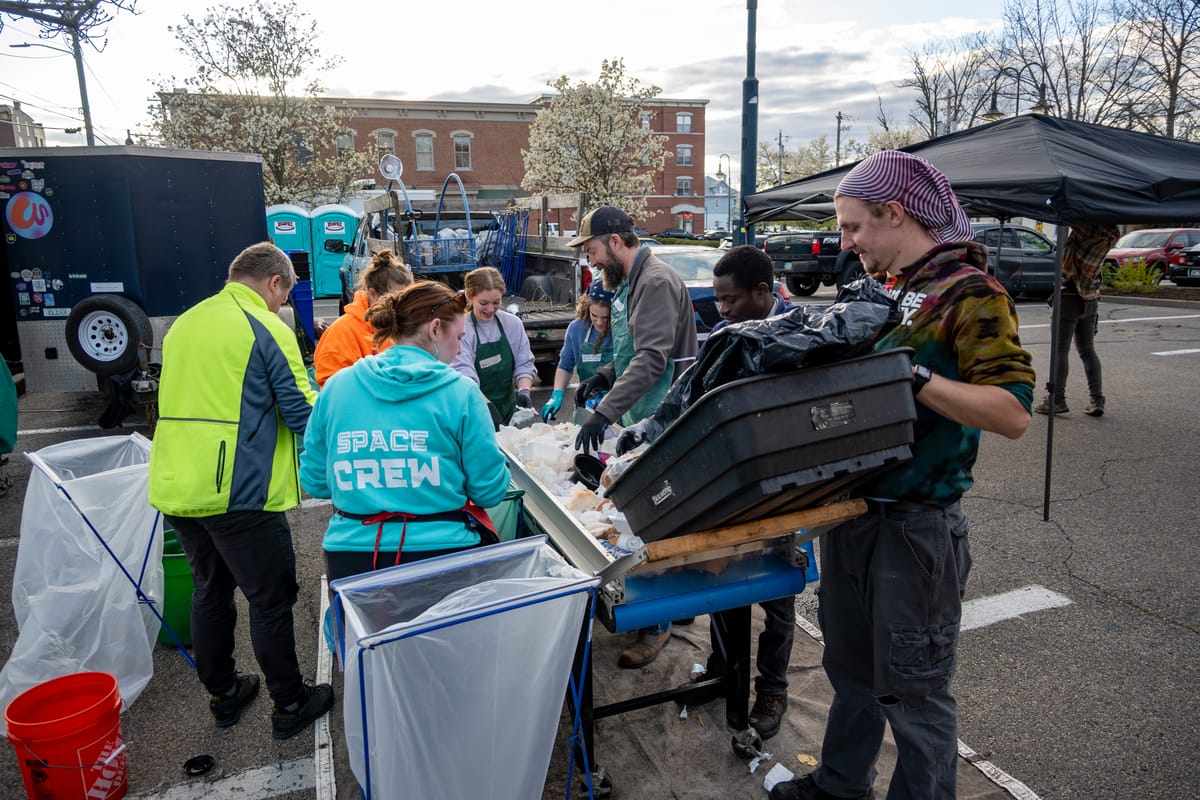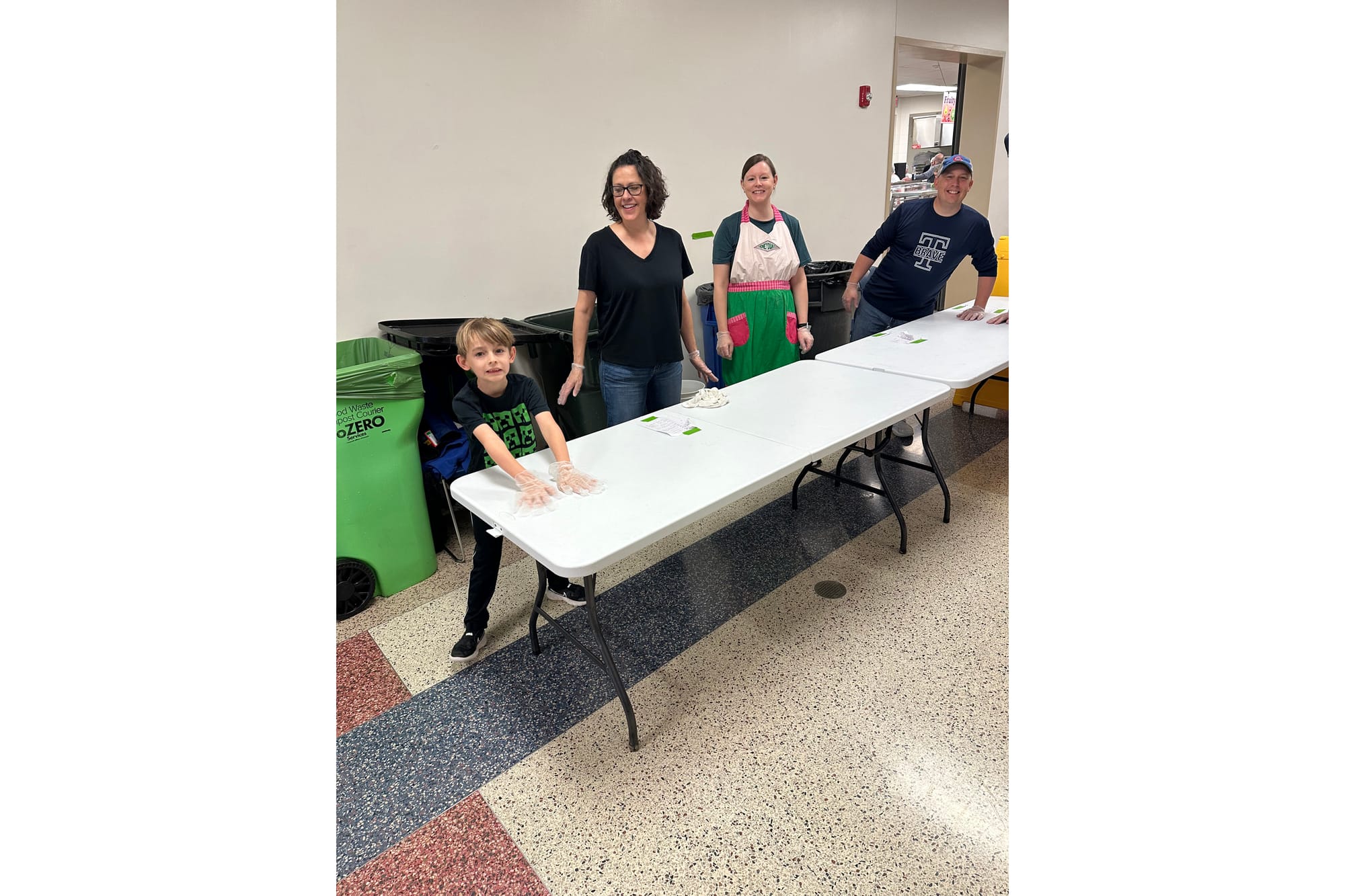How Oxford is keeping trash out of landfills at events
Large-scale events often come with large-scale waste. In Oxford, government initiatives and local organizations' efforts are cutting down on the amount of trash that ends up in landfills after the city's biggest festivals and other celebrations.

Each year, Uptown Oxford serves as the venue for dozens of events, city-sponsored and otherwise.
And those events generate trash.
Cups, plates, napkins, leftovers, bottles and even the boxes vendors use to bring their goods to festivals have to be disposed of somehow. Oxford’s 2023 Climate Action Plan set a goal to become a zero-waste community by 2045, diverting its waste away from landfills and toward recycling and composting instead.
For the past year, Oxford staff have incorporated waste stations at city-sponsored events. Sustainability coordinator Reena Murphy said she’s found that the stations need to be staffed by volunteers to be effective. Recycling contamination — inclusion of materials like food, liquids and some paper towels, which can damage recyclable materials and negatively impact the recycling process — can lead entire loads of recyclables to end up in the landfill.
“We found that contamination is pretty high if you don’t staff the trash can,” Murphy said. “Truly, if you don’t have a person standing there saying, ‘This is recyclable, this is compostable, this goes in the landfill,’ it all just gets intermingled.”
Oxford received a $28,000 Recycle Ohio grant last year to support waste diversion at events and create more outreach and education materials. Murphy said the efforts at the Total Eclipse of the Parks event last April set the gold standard for what’s possible in the city, diverting three quarters of the waste generated, but the effort involved a full team of volunteers and a conveyor belt to pull off. The efforts at the 15 city-sponsored events with waste stations since then have been smaller in scale.
“Waste diversion at these events is quite difficult,” Murphy said. “We are not diverting a lot of waste at these events. One of the big values that we’ve seen, though, is that … we can use that as an education and outreach opportunity to talk about the free recycling in our community or the free food scrap drop-off.”
City staff and officials can pass regulations and implement initiatives like composting and recycling at their own events, but hitting the target of total waste diversion will require buy-in from local residents and organizations, too.
Steve Chaffin joined the Kiwanis Club of Oxford this year and quickly got involved in helping plan the organization’s annual pancake breakfast. An environmental activist since his college days, Chaffin took the lead on how to reduce the amount of trash going to a landfill from the event.
The Kiwanis Club purchased compostable plates and silverware for this year’s meal. Chaffin led a team of volunteers who staffed a waste table at the event, sorting out which items were compostable, recyclable or had to be thrown away.

Chaffin said the initiative was successful this year, reducing the waste by between two-thirds and three-quarters.
“I was very happy with the results,” Chaffin said. “It ended up costing us a couple hundred bucks for the stuff we bought, but all in all, everybody seemed to think it was a great job. I’m hoping to set the example for other organizations that do stuff like this.”
For other groups in town hosting large events, Chaffin recommended having a point person in charge of handling the waste management logistics. He had to research the different items being used at the event, from napkins to syrup containers, to understand how they could be disposed of, then share that information with a team of roughly 10 volunteers who managed the waste table.
Carla Blackmar Rice is an Oxford resident who has been involved in local sustainability efforts. She wrote a zero waste event guide now published on the city’s website. Proper waste management can be complex and discouraging at times, she said, but the best efforts involve making less trash in the first place.
“The act of trying to do lower waste breeds complexity,” Blackmar Rice said, “and so you have to either cut down the variables, or you have to have very informed people helping people navigate the actual point of disposal.”
When organizations hold events that generate trash, Blackmar Rice said it’s helpful to start thinking about waste management early on in the process. It’s easier to help attendees understand what to do when the disposable items can all be thrown out in the same way, like in the compost bin, instead of having a mix of recyclables and compostables.
Consumers can make personal changes to help with waste reduction, too. Blackmar Rice said she limits the amount of disposable goods she uses, opting for Tupperware and other reusable goods instead. She also avoids food delivery services, which add waste. Items that are simple to recycle, like aluminum cans and glass, are also better than plastic goods, she said.
This weekend, the Oxford Chamber of Commerce will hold its annual Wine and Beer Festival. Chamber President Kelli Riggs said they recycle bottles and cans from the event in a city-provided recycling truck, and she hopes to scale up waste reduction efforts at future events, as well.
According to the Environmental Protection Agency, 32.1% of municipal solid waste was recycled or composted in 2018, down from 35% the year before. Oxford residents interested in composting can drop off food scraps in bins outside the TRI Community Center, maintained by GoZERO services.




